Doing Life With… is a BellaNaija Features series that showcases how people live, work, travel, care for their families and… everything in between. We are documenting the lives of all people and ensuring everyone is well-represented at BN.
Did you miss last week’s conversation with Linda Osifo? You can catch up here.
This week, ‘Kunle Adebajo, the Head of Investigations at HumAngle and winner of the 2023 Michael Elliott Award for Excellence in African Storytelling gives us a glimpse into his life. Enjoy!
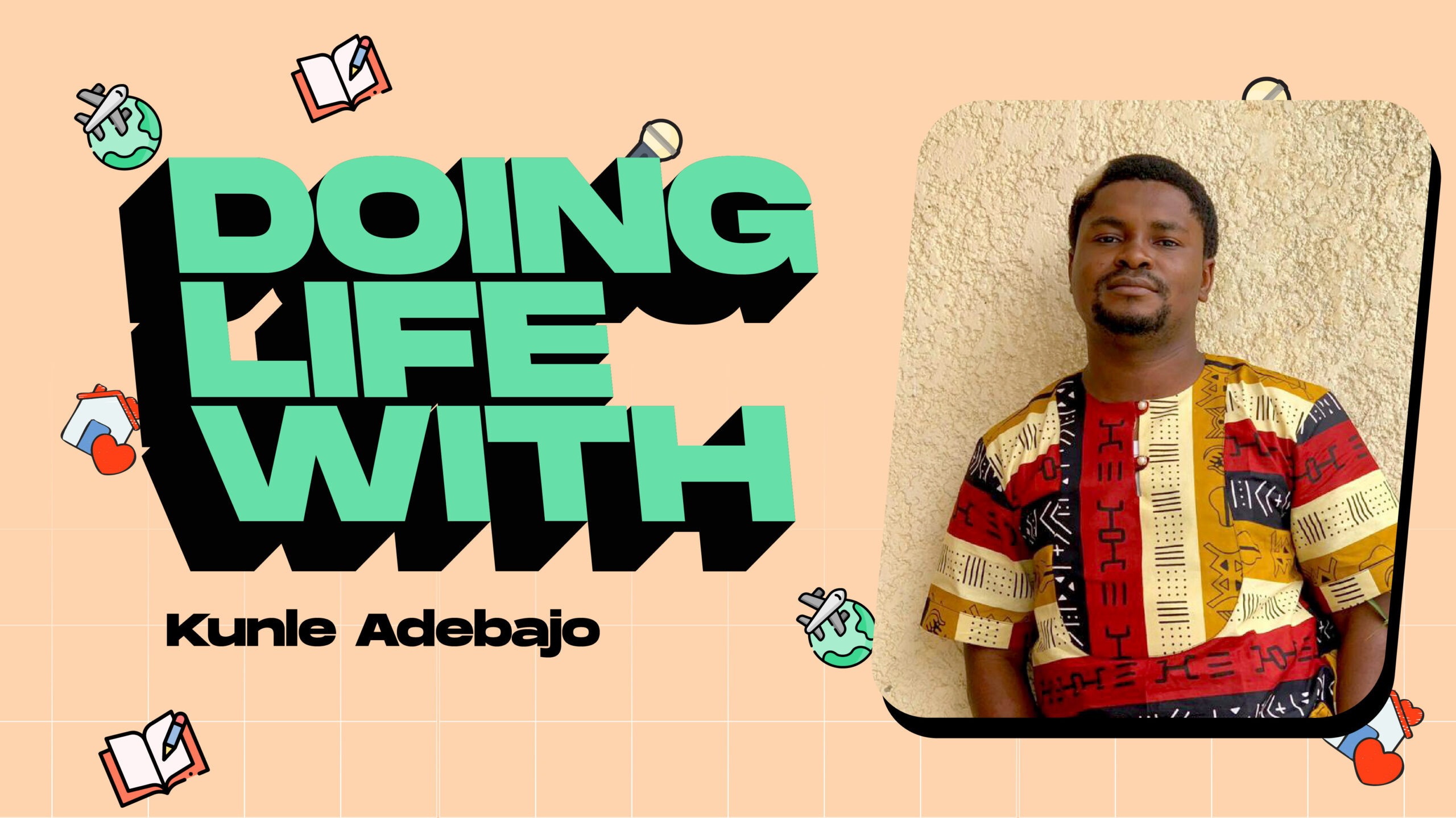
Hi, Kunle. How do you feel today?
I feel well, thank you.
Great! Give me a peep into your childhood
As a child, it didn’t seem like we were poor. Food was always on the table — my civil servant parents ensured it. At least we never ran out of garri, our staple lunch and snack. Also, my school fees were always paid on time. But now, when I think back to that period, I can easily see the threads of poverty woven through it. In school, I loved art and crafting words, so I sought opportunities to write and engage in public speaking. Those early days of mounting the podium were a mess, but I was adamant. I represented my school in some writing competitions and won a couple of medals. One time, I was selected to render a poem at the annual Literary and Debating ceremony. I recited Who Buys My Thoughts by Dennis Osadebe, dressed in the signature khaki shirt, shorts, and hat of Tai Solarin that my mom made.
I had talents as a child. I was blessed with such a good brain that I did not need to read to ace my exams in primary school. One time, I missed classes for a whole term because of an accident and still did exceedingly well. I was effortlessly one of the best students in my secondary school. I went through the JAMB brochure and decided the only university degrees befitting of a smart kid in the Art class were in Law and Mass Communication. It did not help that my family kept stressing how I liked to relentlessly argue my points like a lawyer. I asked questions often, even when it meant defying authority figures. It is one of the reasons I detested being a class captain or representative. The position has a way of forcing you to be respectfully dumb. You don’t want to draw attention to yourself. You cannot be both governor and union leader.
But you were a class captain in secondary school
Actually.
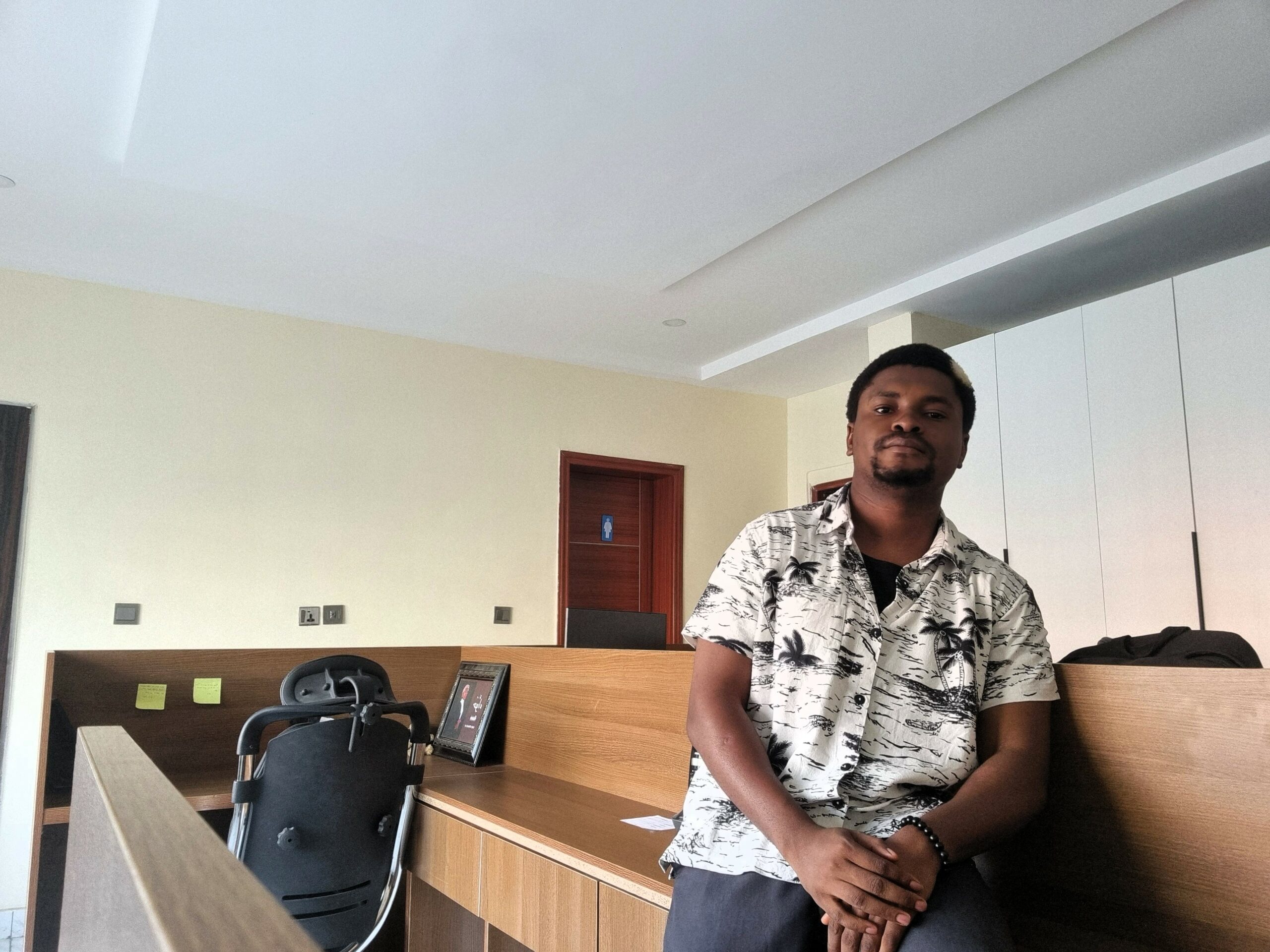
‘Kunle Adebajo
Why journalism?
If you asked me when I was ten years old, I would say, “Because it seems like the best way to earn a living while telling stories, being creative with words, and constantly learning new things.” If you asked me when I was twenty years old, I would probably have said, “Because it gives you an uncommon power to shape people’s opinions.” If you asked me a few years ago, I would have said, “Because it allows you to speak for the abused and underprivileged, to expose injustice, and to hold the powerful to account.” But now, I will simply say because I enjoy doing it and because it is important to document our lives — the good, the bad, the ugly. I still believe in the ideals but if that is your only driving force, you will burn out easily in this work.
How do you approach a report, especially in contexts where there may be challenges or risks involved?
Accuracy is the best defence against those risks. Whatever you do, make sure your reporting is truthful and balanced. Every other consideration is secondary. That way, the only thing people can do is call you names or question why you decided to write the story at a particular time or question why you chose to cover this issue and not something else; they would never be able to condemn the story itself. If, at the end of the day, you suffer because of your work, at least you can beat your chest and say it wasn’t because of a failing on your part.
What role does journalism play in society, particularly in Nigeria or the regions you’ve reported on?
The Hawthorne effect tells us that people behave differently when they know they are being watched. I know this from my stint as class captain in secondary school and how an otherwise raucous gathering of young people would become quiet whenever the noise makers’ list was written. This is the role journalism plays, maybe not as effectively, but it prevents society from descending into absolute chaos. If there were no watchdogs, the political class would act even more shamelessly than it does today. Journalists are there to document injustices and abuses of power so that there would be incontrovertible evidence against the perpetrators. They are there to remind public officeholders of their duties to the people and to remind the people of their rights and responsibilities. Journalists are society’s gyroscope.
What makes you remarkably proud of what you do?
Receiving the news that someone whose wrongful detention I had written about had finally regained freedom and seeing them joyously reunited with their family. This has happened several times.
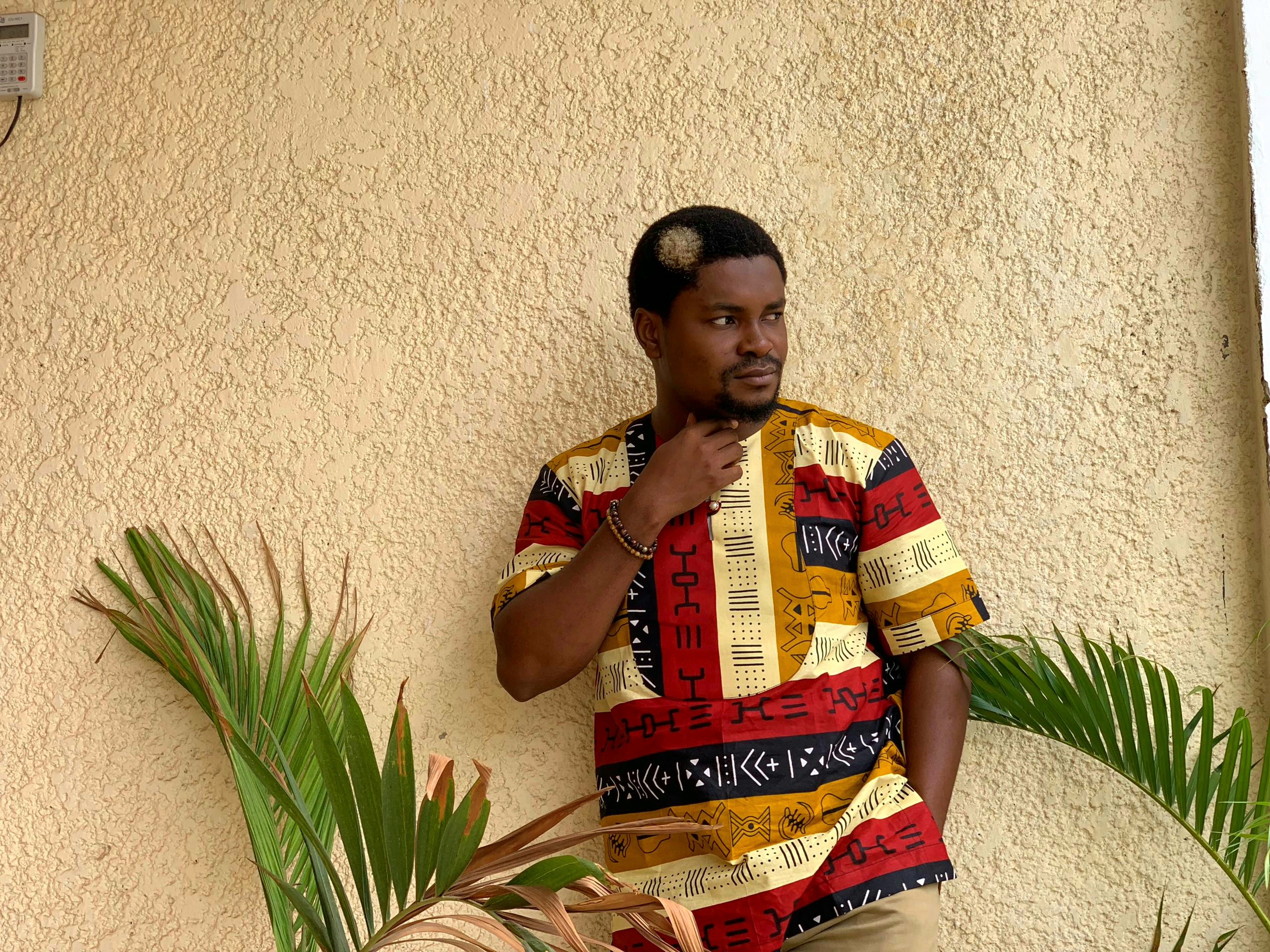
‘Kunle Adebajo
Congratulations on winning the Micheal Elliot Award. Tell me one significant lesson the prize trip gave you
I was at The Economist headquarters in London for close to two weeks. I learned a lot about what it takes to run a reputable international newspaper and to work for one. The most significant lesson I got from the trip, however, came from the other prize winner, Farai Shawn Matiashe, a Zimbabwean journalist. He is a brilliant and prolific writer whose works have appeared on many international platforms. His secret, he says, is that he is a rural journalist as opposed to a hotel journalist. He mingles with the local people and travels to the hinterlands. He does not rely on press statements from the government but goes directly to where the stories are. That statement stayed with me. You are not fully authentic if all you do is regurgitate other reports and analyse information on social media or the internet. You have to gather original information. Interact with people in their communities and let them open up about whatever challenges they face or triumphs they’ve accomplished. Experience a world in its purest form and then you can become truly qualified to tell its story.
That’s inspiring. How do you hope to be remembered as a journalist and as a human?
As someone who set a new standard for storytelling. As someone who inspired many after him to dare pick up a pen and do wonders with it. As someone who, despite his flaws, was committed to not harming other people and not leaving the world worse than he met it. As someone who charted his course and opted for the road less travelled.
Share three works you wish you had written and why you’re sharing them
I have not envied a report enough to think, “Hey, I wish I had written that.” Instead, I sometimes think, “Oh, I wish I had the skills or resources to pull something like this off.” I could only wish I had written something if I had yearned to write it before seeing it, and the other person wrote it just as well as I imagined I would’ve or maybe better.
That’s fair
Yeah, but I’ll mention articles that have greatly impacted me. Jennifer Senior’s What Bobby Mcilvaine Left Behind because of the intriguing storytelling and refreshing retelling of a two-decade-old event. Gay Talese’s Frank Sinatra Has A Cold because of its wild success and how both seminal and influential it’s been when it comes to acceptable writing styles in journalism. Anne Applebaum’s Ukraine And The Words That Lead To Mass Murder, because it showed me that you could talk about a topic as heavy as war and genocide from the perspective of something as delicate and not readily apparent as language. John Hersey’s Hiroshima because of its unusual narrative technique, its depth and its vivid descriptions. Abubakar Adam Ibrahim’s All That Was Familiar because after reading it, I started aspiring to become more than just a journalist. I aspired to become a storyteller and Abubakar pulled that dream closer home for me.
I said three pieces, haha
There’s just a lot.
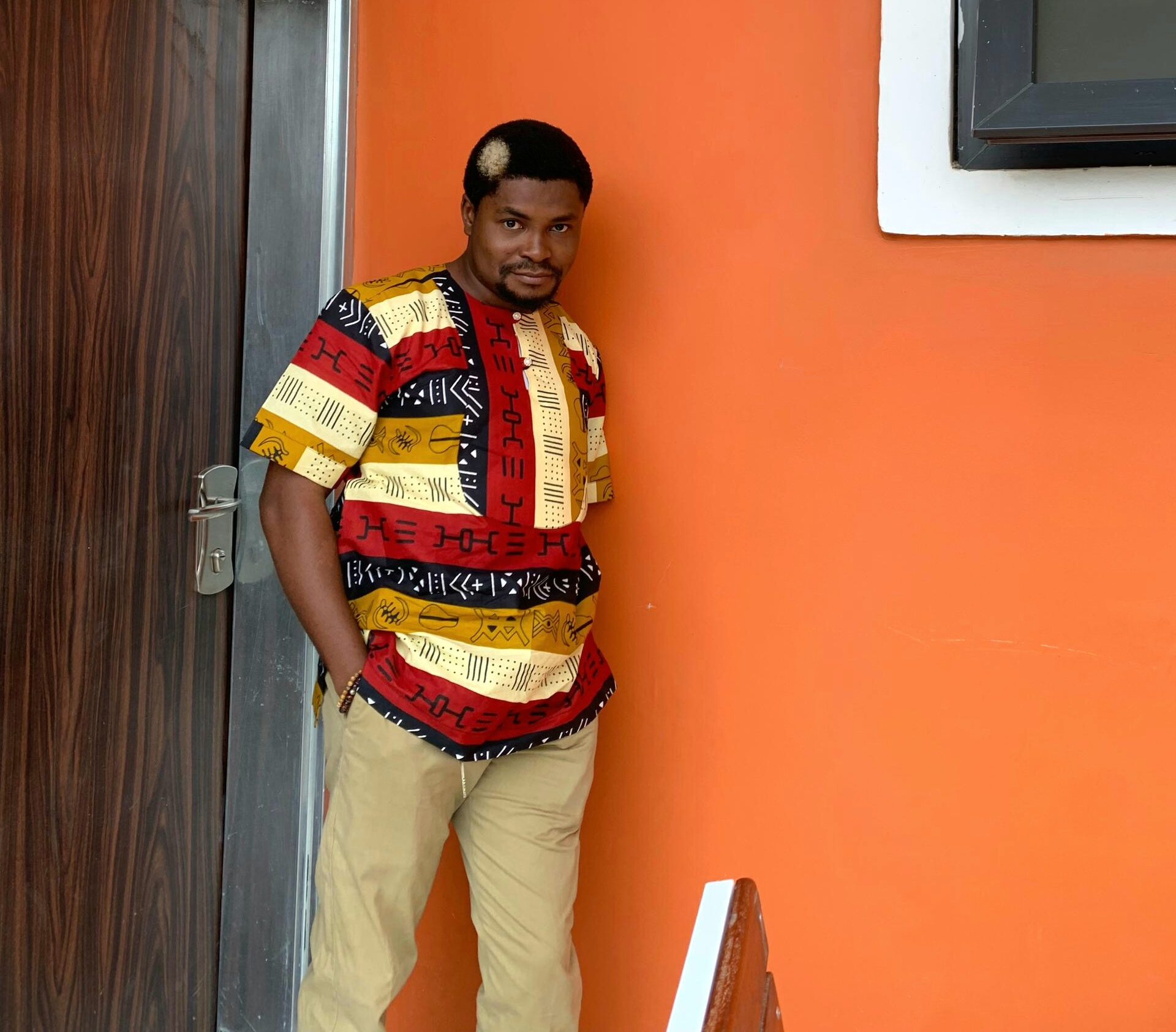
‘Kunle Adebajo
What’s a typical day in your life?
I am a morning person and I find that my productivity and motivation for the day depend on how well I start my day. I resolved last year to read at least ten pages of a book every day, and I started doing that in the morning. However, my routine was interrupted by a long trip, and I have not been able to get back on track since then. I believe the issue lies not in the lack of interesting books, but in a lack of drive. The good this is I have started working out early in the morning. I usually go to the gym, but if I can’t, I use a skipping rope and dumbbells indoors or go for a walk. For the rest of the day, I work on my laptop either at the office or at home. I listen to podcasts when driving or taking a morning stroll, and I listen to music when driving back home. In the evening, I usually watch Netflix while having dinner. Lately, I have been watching a docuseries called The Turning Point (I can’t wait for the second season of Black Clover.) If I can’t find anything interesting on Netflix, I switch to YouTube and watch various educational and entertaining videos, such as explainers, business pitches, stand-up comedy, skits, and TEDx talks. I usually go to bed early, around 10 pm, and on weekends, I spend time sketching on my laptop or writing articles that are not work-related. I also hang out with friends occasionally.
What’s that unconventional thought you have about the world that you think people might not agree with?
Everyone should use Oxford commas.
People don’t use that?
You will be surprised. Also, I don’t think we should aspire to urbanise every corner of the world. Yes, we should try to improve people’s quality of life and reduce mortality rates everywhere. But everywhere shouldn’t be like Singapore, New York or London. The world needs villages and somewhat dysfunctional societies, even if only to serve as a foil. We must acknowledge, too, that many aspects of development come with a trade-off. So whenever we get something wrong, we should have societies serving as real-time time machines to help us compare notes, reconsider our approaches, and possibly undo our errors.
Hmm
I also don’t think men need to get a haircut every week or every two weeks. What is the obsession with looking picture-perfect all the time when we are not robots?
Men or Kunle?
Men, haha.
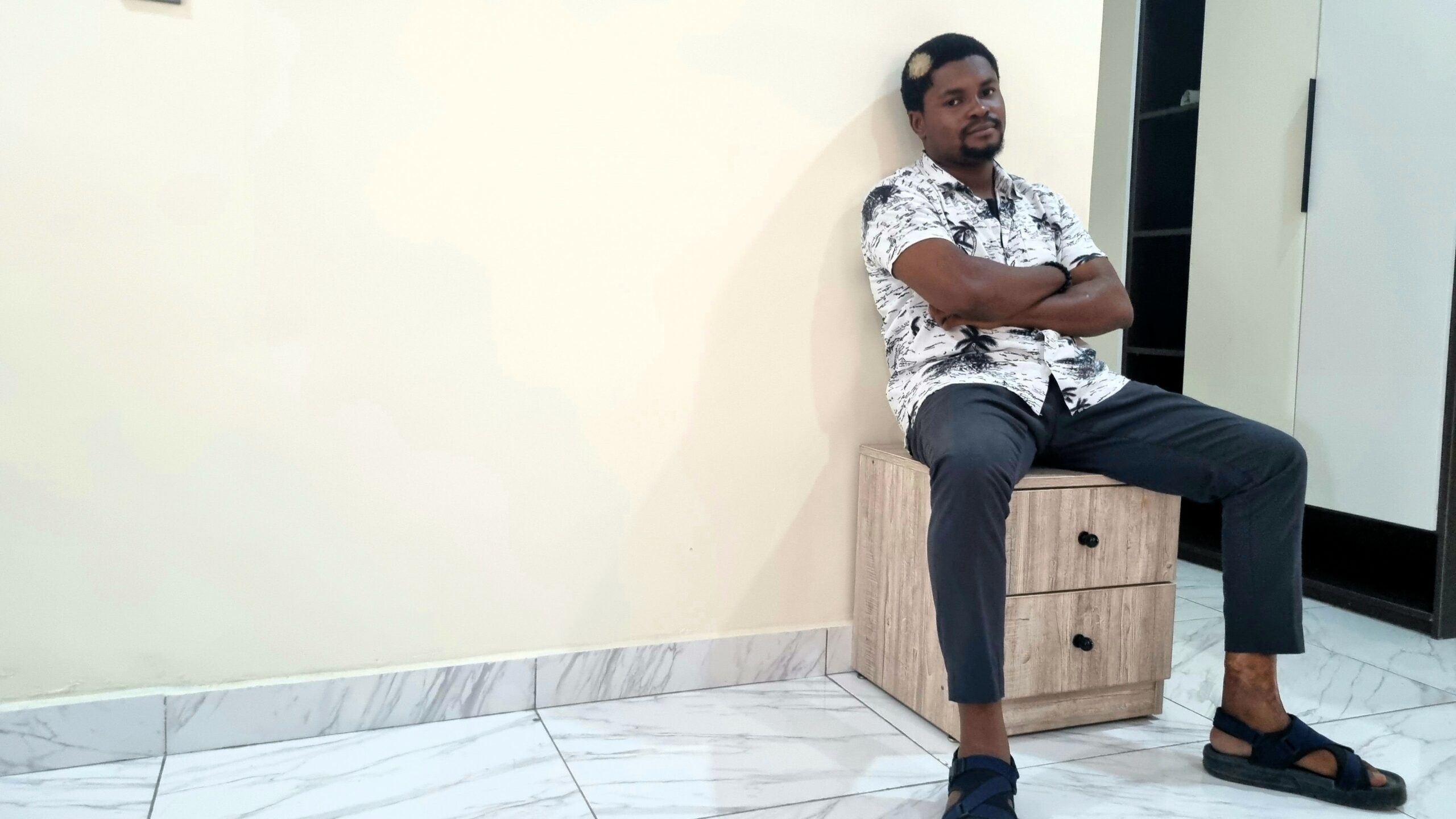
‘Kunle Adebajo
What are the little things in your everyday life excite you or make you feel alive?
I love taking random pictures. When I can take a picture of something and it comes out exactly as I envisioned it, that certainly drives me to live and experience the world around me. I cherish it when someone unexpectedly asks for my help and I can help. The child in me also leaps for joy when I get heartwarming feedback about my work. And my goodness, sinking my teeth into a well-roasted cob of corn fills me with undiluted pleasure.
Journalism 101?
Never ask a person during an interview, “Can we meet you?” Or say, “Please introduce yourself to people who do not know you.” Ask specific questions that show you’ve done your homework. Also, if ever you are in doubt, find out. You are contributing to the first draft of history; it is your duty to not be wrong.
Kunle Adebajo in three words?
Someone recently described me as moderately anti-establishment, but what I am is a sceptic. I find it difficult to accept an instruction or policy simply because someone shouts it. I want to be sure it is well thought-out. Two other words: reserved (almost unsocial) and ridiculously funny.
Thank you for being on Doing Life With…, Kunle
Thank you for having me.
___________________________________________________
Many thanks to Kunle Adebajo for having this conversation with us and answering all our questions – and swiftly too, we must add.
Do you love this content, have any feedback for us or want to be a BellaNaija Features contributor? We’d love to read from you. Shoot us an email: [email protected]. Join us on Saturday for the next episode!
The post ‘Kunle Adebajo on Journalism & His Favourite Works in Today’s “Doing Life With…” appeared first on BellaNaija - Showcasing Africa to the world. Read today!.
Continue reading...
Did you miss last week’s conversation with Linda Osifo? You can catch up here.
This week, ‘Kunle Adebajo, the Head of Investigations at HumAngle and winner of the 2023 Michael Elliott Award for Excellence in African Storytelling gives us a glimpse into his life. Enjoy!

Hi, Kunle. How do you feel today?
I feel well, thank you.
Great! Give me a peep into your childhood
As a child, it didn’t seem like we were poor. Food was always on the table — my civil servant parents ensured it. At least we never ran out of garri, our staple lunch and snack. Also, my school fees were always paid on time. But now, when I think back to that period, I can easily see the threads of poverty woven through it. In school, I loved art and crafting words, so I sought opportunities to write and engage in public speaking. Those early days of mounting the podium were a mess, but I was adamant. I represented my school in some writing competitions and won a couple of medals. One time, I was selected to render a poem at the annual Literary and Debating ceremony. I recited Who Buys My Thoughts by Dennis Osadebe, dressed in the signature khaki shirt, shorts, and hat of Tai Solarin that my mom made.
I had talents as a child. I was blessed with such a good brain that I did not need to read to ace my exams in primary school. One time, I missed classes for a whole term because of an accident and still did exceedingly well. I was effortlessly one of the best students in my secondary school. I went through the JAMB brochure and decided the only university degrees befitting of a smart kid in the Art class were in Law and Mass Communication. It did not help that my family kept stressing how I liked to relentlessly argue my points like a lawyer. I asked questions often, even when it meant defying authority figures. It is one of the reasons I detested being a class captain or representative. The position has a way of forcing you to be respectfully dumb. You don’t want to draw attention to yourself. You cannot be both governor and union leader.
But you were a class captain in secondary school
Actually.

‘Kunle Adebajo
Why journalism?
If you asked me when I was ten years old, I would say, “Because it seems like the best way to earn a living while telling stories, being creative with words, and constantly learning new things.” If you asked me when I was twenty years old, I would probably have said, “Because it gives you an uncommon power to shape people’s opinions.” If you asked me a few years ago, I would have said, “Because it allows you to speak for the abused and underprivileged, to expose injustice, and to hold the powerful to account.” But now, I will simply say because I enjoy doing it and because it is important to document our lives — the good, the bad, the ugly. I still believe in the ideals but if that is your only driving force, you will burn out easily in this work.
How do you approach a report, especially in contexts where there may be challenges or risks involved?
Accuracy is the best defence against those risks. Whatever you do, make sure your reporting is truthful and balanced. Every other consideration is secondary. That way, the only thing people can do is call you names or question why you decided to write the story at a particular time or question why you chose to cover this issue and not something else; they would never be able to condemn the story itself. If, at the end of the day, you suffer because of your work, at least you can beat your chest and say it wasn’t because of a failing on your part.
What role does journalism play in society, particularly in Nigeria or the regions you’ve reported on?
The Hawthorne effect tells us that people behave differently when they know they are being watched. I know this from my stint as class captain in secondary school and how an otherwise raucous gathering of young people would become quiet whenever the noise makers’ list was written. This is the role journalism plays, maybe not as effectively, but it prevents society from descending into absolute chaos. If there were no watchdogs, the political class would act even more shamelessly than it does today. Journalists are there to document injustices and abuses of power so that there would be incontrovertible evidence against the perpetrators. They are there to remind public officeholders of their duties to the people and to remind the people of their rights and responsibilities. Journalists are society’s gyroscope.
What makes you remarkably proud of what you do?
Receiving the news that someone whose wrongful detention I had written about had finally regained freedom and seeing them joyously reunited with their family. This has happened several times.

‘Kunle Adebajo
Congratulations on winning the Micheal Elliot Award. Tell me one significant lesson the prize trip gave you
I was at The Economist headquarters in London for close to two weeks. I learned a lot about what it takes to run a reputable international newspaper and to work for one. The most significant lesson I got from the trip, however, came from the other prize winner, Farai Shawn Matiashe, a Zimbabwean journalist. He is a brilliant and prolific writer whose works have appeared on many international platforms. His secret, he says, is that he is a rural journalist as opposed to a hotel journalist. He mingles with the local people and travels to the hinterlands. He does not rely on press statements from the government but goes directly to where the stories are. That statement stayed with me. You are not fully authentic if all you do is regurgitate other reports and analyse information on social media or the internet. You have to gather original information. Interact with people in their communities and let them open up about whatever challenges they face or triumphs they’ve accomplished. Experience a world in its purest form and then you can become truly qualified to tell its story.
That’s inspiring. How do you hope to be remembered as a journalist and as a human?
As someone who set a new standard for storytelling. As someone who inspired many after him to dare pick up a pen and do wonders with it. As someone who, despite his flaws, was committed to not harming other people and not leaving the world worse than he met it. As someone who charted his course and opted for the road less travelled.
Share three works you wish you had written and why you’re sharing them
I have not envied a report enough to think, “Hey, I wish I had written that.” Instead, I sometimes think, “Oh, I wish I had the skills or resources to pull something like this off.” I could only wish I had written something if I had yearned to write it before seeing it, and the other person wrote it just as well as I imagined I would’ve or maybe better.
That’s fair
Yeah, but I’ll mention articles that have greatly impacted me. Jennifer Senior’s What Bobby Mcilvaine Left Behind because of the intriguing storytelling and refreshing retelling of a two-decade-old event. Gay Talese’s Frank Sinatra Has A Cold because of its wild success and how both seminal and influential it’s been when it comes to acceptable writing styles in journalism. Anne Applebaum’s Ukraine And The Words That Lead To Mass Murder, because it showed me that you could talk about a topic as heavy as war and genocide from the perspective of something as delicate and not readily apparent as language. John Hersey’s Hiroshima because of its unusual narrative technique, its depth and its vivid descriptions. Abubakar Adam Ibrahim’s All That Was Familiar because after reading it, I started aspiring to become more than just a journalist. I aspired to become a storyteller and Abubakar pulled that dream closer home for me.
I said three pieces, haha
There’s just a lot.

‘Kunle Adebajo
What’s a typical day in your life?
I am a morning person and I find that my productivity and motivation for the day depend on how well I start my day. I resolved last year to read at least ten pages of a book every day, and I started doing that in the morning. However, my routine was interrupted by a long trip, and I have not been able to get back on track since then. I believe the issue lies not in the lack of interesting books, but in a lack of drive. The good this is I have started working out early in the morning. I usually go to the gym, but if I can’t, I use a skipping rope and dumbbells indoors or go for a walk. For the rest of the day, I work on my laptop either at the office or at home. I listen to podcasts when driving or taking a morning stroll, and I listen to music when driving back home. In the evening, I usually watch Netflix while having dinner. Lately, I have been watching a docuseries called The Turning Point (I can’t wait for the second season of Black Clover.) If I can’t find anything interesting on Netflix, I switch to YouTube and watch various educational and entertaining videos, such as explainers, business pitches, stand-up comedy, skits, and TEDx talks. I usually go to bed early, around 10 pm, and on weekends, I spend time sketching on my laptop or writing articles that are not work-related. I also hang out with friends occasionally.
What’s that unconventional thought you have about the world that you think people might not agree with?
Everyone should use Oxford commas.
People don’t use that?
You will be surprised. Also, I don’t think we should aspire to urbanise every corner of the world. Yes, we should try to improve people’s quality of life and reduce mortality rates everywhere. But everywhere shouldn’t be like Singapore, New York or London. The world needs villages and somewhat dysfunctional societies, even if only to serve as a foil. We must acknowledge, too, that many aspects of development come with a trade-off. So whenever we get something wrong, we should have societies serving as real-time time machines to help us compare notes, reconsider our approaches, and possibly undo our errors.
Hmm
I also don’t think men need to get a haircut every week or every two weeks. What is the obsession with looking picture-perfect all the time when we are not robots?
Men or Kunle?
Men, haha.

‘Kunle Adebajo
What are the little things in your everyday life excite you or make you feel alive?
I love taking random pictures. When I can take a picture of something and it comes out exactly as I envisioned it, that certainly drives me to live and experience the world around me. I cherish it when someone unexpectedly asks for my help and I can help. The child in me also leaps for joy when I get heartwarming feedback about my work. And my goodness, sinking my teeth into a well-roasted cob of corn fills me with undiluted pleasure.
Journalism 101?
Never ask a person during an interview, “Can we meet you?” Or say, “Please introduce yourself to people who do not know you.” Ask specific questions that show you’ve done your homework. Also, if ever you are in doubt, find out. You are contributing to the first draft of history; it is your duty to not be wrong.
Kunle Adebajo in three words?
Someone recently described me as moderately anti-establishment, but what I am is a sceptic. I find it difficult to accept an instruction or policy simply because someone shouts it. I want to be sure it is well thought-out. Two other words: reserved (almost unsocial) and ridiculously funny.
Thank you for being on Doing Life With…, Kunle
Thank you for having me.
___________________________________________________
Many thanks to Kunle Adebajo for having this conversation with us and answering all our questions – and swiftly too, we must add.
Do you love this content, have any feedback for us or want to be a BellaNaija Features contributor? We’d love to read from you. Shoot us an email: [email protected]. Join us on Saturday for the next episode!
The post ‘Kunle Adebajo on Journalism & His Favourite Works in Today’s “Doing Life With…” appeared first on BellaNaija - Showcasing Africa to the world. Read today!.
Continue reading...

